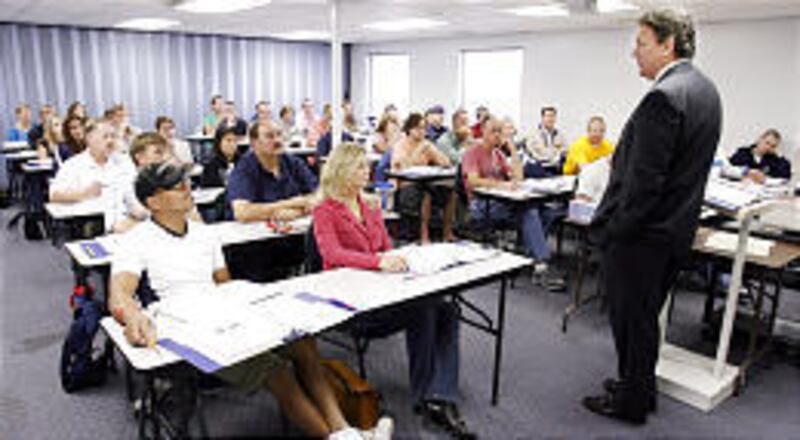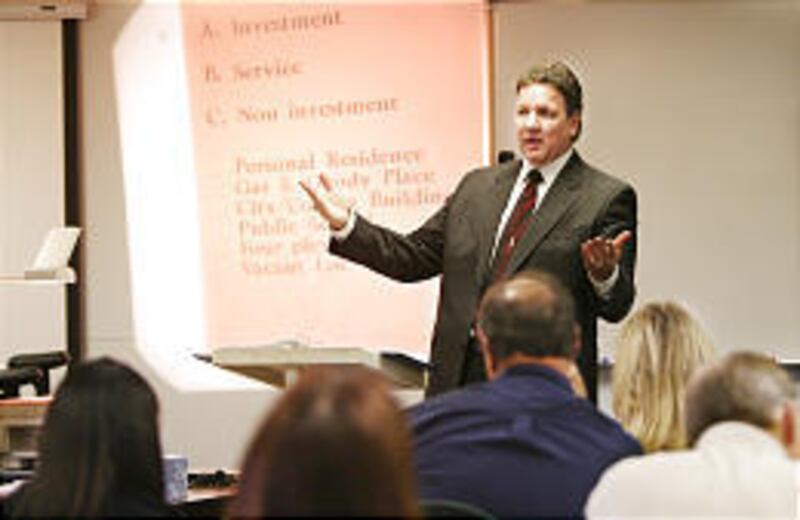The day Dougan Jones received his real estate license in 1979, interest rates were topping 18 percent and few people were buying homes.
Fewer, still, were the number of people trying to make a living in the often turbulent and competitive industry of real estate sales.
Twenty-six years later, a red-hot housing market and the lure of "easy money" are attracting thousands of Utahns to embark on a career in real estate.
"It's not uncommon in certainly active hot markets for people to get in the business," said Jones, now chief executive officer and owner of Park City-based Prudential Utah Real Estate. "There's a lot of transactions."
As of June 30, the number of licensed real estate agents in Utah was 19,405, a 27 percent rise from 15,260 agents in fiscal year 2002, according to the Utah Division of Real Estate.
In fact, real estate agents outnumber nearly every other licensed profession in the state, including certified public accountants, contractors, electricians, massage therapists, registered nurses and physicians. Only cosmetologists and barbers boast higher numbers, according to Clark Caras, a spokesman for the Utah Department of Commerce.
Despite the competition from other agents, many people see the relatively easy entry into the profession as a quick way to cash in on Utah's booming housing market.
They are people like April Wilcox, 24, of Sandy, who last week finished the 90 hours of course work required by the state before taking her real estate exam.
"My husband is an investor," Wilcox said. "We were paying money to an agent, and we thought that was silly when he could pay money to me."
Wilcox said she will go to work for a small local brokerage to gain experience.
"I think that sometimes people get confused about what our role is as real estate agents," Wilcox said. "We're not there to just take their money and to leave them high and dry. We're there to market their house."
Others, like Emmanuel Balane, 41, a former restaurant owner, see real estate as a path to financial independence. Balane said he is certain he can earn more than $50,000 his first year as an agent. He even has set his sights on making more than $100,000.
But what if mortgage interest rates suddenly rise and fewer people purchase homes?
"I don't think the market will go down like that," Balane said. "A lot of people from different states are coming over to Utah and are buying houses. A lot of people are buying homes for investment."
Kevin Swenson, president of Salt Lake-based Stringham Real Estate School, said this year the school will graduate more people wanting a real estate license than in any previous year since the school began in 1989.
For $450 and a time investment of as little as three weeks, the school offers prospective real estate agents the 90 hours of education needed before they take the real estate exam.
Six classes are offered every day from 9 a.m. to 10 p.m.
"We've had a steady increase of students over the last three years to the degree that it's unexplainable," said Arnold Stringham, one of the school's founders. "We've had as many as 115 students in the building at a time taking the sales class. It's been so huge that this year we've had to split our sales classes in half three times a day almost every day of the year."
Derek Miller, director of the Utah Division of Real Estate, said he believes the ranks of real estate agents will continue to swell as long as the economy stays good. In fact, Miller said, the number of real estate agents in Utah is actually lagging when compared with the state's market growth.
"We realize that there is a perception that anyone or everyone can become a real estate agent, but it's a false perception," Miller said. "These are hard-working pro- fessionals."
Debra Sjoblom, president of the Salt Lake Board of Realtors and an agent with Salt Lake-based Chapman and Richards, said membership in the Salt Lake board is roughly 7,000 agents.
Sjoblom, who has been an agent since 1977, has seen her share of up and down markets. New agents, she said, face a host of challenges that include fierce competition, a learning curve and startup expenses.
She said about half of all new agents will drop out of the business within two years.
"They think it's quick, easy money, and it's neither," Sjoblom said. "People think, 'Oh, you drive a really nice car and you have pretty cute clothes and you get to look at nice houses.' Let's start talking about the paperwork and the disclosures and the inspections. You just wouldn't believe all the behind-the-scenes little problems."
Sjoblom said being a successful real estate agent requires more than good sales skills.
"You need to know about home inspections. You need to know about radon, lead paint, different types of mortgages and title insurance," Sjoblom said. "You need to know how to prequalify somebody. You have to be able to know what to say and when to shut up. You need to get all that down before you even can worry about throwing somebody in your car and driving them around."
Steve Cook, a spokesman for the National Association of Realtors, said Utah's growing number of agents is reflective of a national trend.
As of Sept. 30, NAR reported its membership at 1,248,251, a nearly 13 percent increase from a year earlier. From 2002 to 2004, NAR's membership increased 26.6 percent.
According to a 2005 report by NAR, the typical agent in 2004 earned a median income of $49,300 and had annual business expenses of $8,200.
"There are people in the industry who do make a lot of money," Sjoblom said. "But again I think it is the 80/20 rule, where 20 percent of the people are doing 80 percent of the business."
Some brokerages are hesitant to hire new agents, like Prudential Utah Real Estate, which has 550 agents in the state.
"It's not the case that we never hire new agents," Jones said. "Our first message to them is go to another company where you can learn the business and get some experience. Once you have a fair amount of experience, come back and talk to us."
Those obstacles have not deterred Allan Dubon, 21, of Layton, who speaks Spanish and English and sees a need for bilingual agents.
"I really enjoy working with people and talking to them," said Dubon, who started taking real estate classes two weeks ago. Dubon said he thinks he can make $60,000 his first year as an agent.
"I've given myself a few months to see how it goes," Dubon said. "Then I can decide whether I will just cut back and go into another job and do real estate part time."
Despite the large rise in the number of agents, industry experts say the market ultimately will have the final say on who succeeds.
"The real estate industry is cyclical," Jones said, "and there will come a time when the heat of our present market will cool, and when it does many of those agents will get out of the business."
E-mail: danderton@desnews.com




